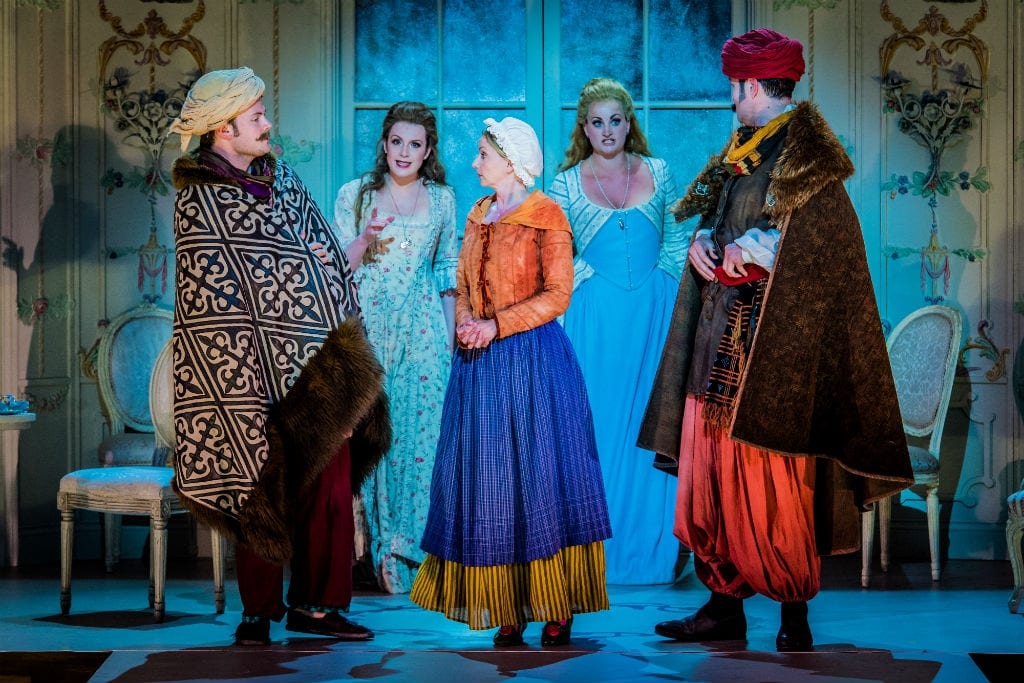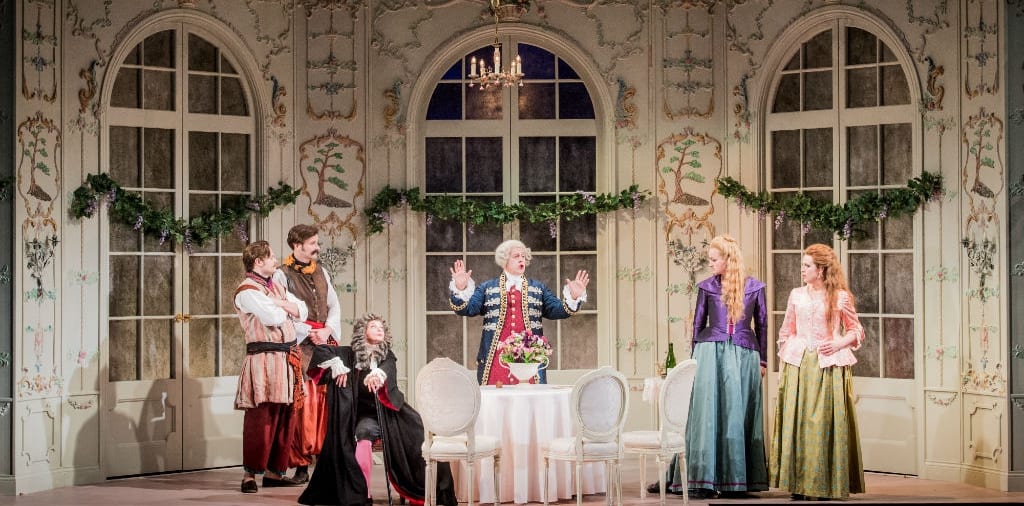A really fine performance of this opera is very rare: often productions veer too much in the direction of cheap farce on the one hand or brittle cynicism on the other. This one deserves huge praise for finding a plausible and convincing pathway through the thicket of obstacles both musical and dramatic that lie in wait for the unwary director or performer. This is an opera of fine lines, between broad comedy and tragedy, crude sexual stereotypes and refined, ambiguous romantic suggestion, heroic virtues and their mirror parodies. Oliver Platt’s production triumphantly offers all of these possibilities in rare balance across a wholly engrossing evening as the dusk gradually gathers…
On the face of it this opera should repel rather than beguile. The plot is trite and in today’s terms quite unpleasant: as part of a wager with an older roué two debonair lovers pretend to go off to war and then return as exotic ‘Albanians’ in order to test the fidelity of their girlfriends by trying to seduce the other’s partner. They are aided and abetted in this by the ladies’ maid. One girl resists more resiliently than the other, but both finally succumb, leading to the conclusion embodied in the title of the piece – ‘thus do all women’.
But that is only a fraction of the story. Around this apparently feeble Rococo fable, Mozart and Da Ponte weave a score that has claims be to the greatest masterpiece of their three collaborations. Deep questions about the meaning of love, whether indeed it can ever have a stable meaning, and the nature of personal identity are explored with astonishing emotional penetration, as each character in turn examines and probes their psychological dilemmas and unedifying choices. And this is done with music of exquisite and sustained beauty of line and variety of orchestral texture that the composer rarely if ever equals. Artifice and art slide effortlessly back and forth in continuous compelling dialogue.

The creative team in this production wisely let the music and the performers make the case for the work within a traditional yet flexible setting that allows full scope for both intimacy and set-piece crowd scenes. Alyson Cummins’ set provides an elegant pastel and floral interior with plenty of doors and windows that folds outwards to provide more space for assignations and whispered asides. Rory Beaton’s lighting design takes full advantage of the natural fading of a summer evening and delicately accentuates the romantic atmosphere where needed. Costumes have the period detail and colouristic flair that we have come to expect from this company in recent years, especially in the exotic Albanian garb of the lovers.
The cast of six is uniformly excellent, with strong support from the chorus who fill the broad stage with plausible and varied activity whenever they appear. In the pit from the overture onwards Dane Lam sets a clean and brisk pace, as he did in ‘Don Giovanni’ last year, while giving plenty of scope for instrumental solos in which the horns of the City of London Sinfonia showed particularly fine form. At every point there is some delectable moment of counterpoint commentary which underscores the mood and sentiment of the singers and it all registers here.
Eleanor Dennis and Kitty Whately, as the two sisters, have well contrasted voices, but it is Dennis who expresses her divided state of mind most keenly and with great dramatic effect: her second main aria had extraordinary intensity of delivery, gaining an ovation from conductor and orchestra as much as from the audience. Sarah Tynan’s gamine and silvery-voiced antics as the maid Despina provided continual comic stimulus, especially in disguise as a doctor and notary.
As the malign master of ceremonies, Don Alfonso, Peter Coleman-Wright was suave and insinuating with a hint of menace – more a man of reason of state than simply reason. And the two lovers in disguise both had ease of voice and charm of manner: Nicholas Lester as Guglielmo, the one with greater swagger, and Nick Pritchard’s Ferrando, the more sweetly amorous and indeed ambiguous over which lady he may end up with.
It is hard to imagine how this work might be better done: by concentrating modestly on how to bring out its essential merits this production avoids the common error of imposing alien criteria that evince an essential lack of belief in the work itself. 2018 is shaping up to be an outstanding season at Opera Holland Park, and this delicately evoked masterpiece is not to be missed.

